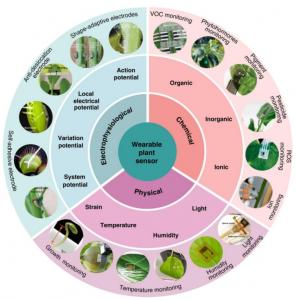Wearable plant sensors devices for precision agriculture and environmental monitoring
FAYETTEVILLE, GA, UNITED STATES, May 13, 2025 /EINPresswire.com/ -- This review summarizes the research progress on flexible wearable sensors based on different plant signals and classifies them according to their functions: physical sensors, chemical sensors and electrophysiological sensors. Furthermore, the challenges currently faced by wearable plant sensors are presented and we propose a design framework for next-generation plant wearable sensors enabling continuous real-time plant health monitoring under field conditions.
Around 700 million people worldwide still face food shortages. To address the rising threat of population growth, cultivated land reduction and environmental degradation, there is an urgent need to develop intelligent plant monitoring system to ensure healthy crop growth. In a review article published in the KeAi journal Wearable Electronics, a team of researchers from China summarizes the recent progress in wearable plant sensing devices for intelligent agricultural monitoring system.
“Plants produce a variety of signals that can reflect their health status under stress. To accurately obtain the health signals of plants, wearable sensors need to be used for in-situ monitoring,” explains co-corresponding author Feilong Zhang, professor in flexible sensor for plant health monitoring at Technical Institute of Physics and Chemistry at the Chinese Academy of Sciences. “Wearable sensors can be closely attached to the plant surface to monitor the plant growth rate, leaf surface temperature and humidity, organic volatiles released, and electrophysiological signals in real time.”
The team systematically summaried the current status and recent research progress of wearable sensor devices for plant monitoring. Wearable plant sensors are categorized based on their detected signals: physical signals (growth deformation, light, humidity, temperature), chemical signals (gases, pesticide residues, ion changes), and electrophysiological signals. An overview of the constituent materials, fabrication methods, and sensing mechanisms corresponding to these signals is provided in this review. Additionally, the challenges and development trends of flexible wearable plant sensors are discussed, including issues related to sensor attachment, gas exchange and device interference on complex surfaces.
“While challenges remain, ongoing innovation and cross-disciplinary collaboration are paving the way for wearable sensors to become vital tools in precision agriculture and ecological monitoring — supporting smarter, more sustainable farming systems,” says Zhang.
References
DOI
10.1016/j.wees.2025.03.002
Original Source URL
https://doi.org/10.1016/j.wees.2025.03.002
Funding Information
This work was financially supported by the Strategic Priority Research Program of the Chinese Academy of Sciences (XDB1030402), the National Natural Science Foundation of China (22035008, 22375016), the Beijing Outstanding Young Scientist Program (JWZQ20240102014) and the Beijing Municipal Science and Technology Commission (2182036).
Lucy Wang
BioDesign Research
email us here
Legal Disclaimer:
EIN Presswire provides this news content "as is" without warranty of any kind. We do not accept any responsibility or liability for the accuracy, content, images, videos, licenses, completeness, legality, or reliability of the information contained in this article. If you have any complaints or copyright issues related to this article, kindly contact the author above.
VAP Group to Host the Global Blockchain Show 2025 in Abu Dhabi
Greater Chamber of Harlingen Earns Top State Media Excellence Honor
Inside the Compliance Crisis: Navigating Compliance With Digital Inspection Tools That Support Affordable Housing
Więcej ważnych informacji
 Jedynka Newserii
Jedynka Newserii

 Jedynka Newserii
Jedynka Newserii

Konsument

Tylko 35 proc. Celów Zrównoważonego Rozwoju ONZ możliwe do osiągnięcia przed 2030 r. Potrzebna ściślejsza współpraca międzynarodowa
Jak wynika z raportu ONZ, choć w ciągu ostatniej dekady dzięki dążeniu do realizacji przyjętych celów udało się poprawić życie milionów ludzi na całym świecie, to jednak tempo zmian pozostaje zbyt wolne, by dało się je osiągnąć do 2030 roku. Postęp hamują przede wszystkim eskalacja konfliktów, zmiana klimatu, rosnące nierówności i niewystarczające finansowanie. Jak wynika ze sprawozdania Parlamentu Europejskiego, problemem jest także brak ścisłej współpracy międzynarodowej i sceptyczne podejście niektórych państw ONZ.
Przemysł spożywczy
UNICEF: Wszystkie dzieci poniżej piątego roku życia w Gazie cierpią z powodu niedożywienia. Sytuacja jest katastrofalna

Ataki Izraela na Strefę Gazy i jej izolacja doprowadziły do całkowitego załamania podstawowych usług i ograniczenia możliwości dostaw i dystrybucji pomocy humanitarnej – wskazuje UNICEF. W efekcie setki tysięcy Palestyńczyków są w sytuacji ciągłego zagrożenia życia i cierpią z powodu niedożywienia i głodu. Ta klęska dotyczy praktycznie wszystkich dzieci poniżej piątego roku życia. Konflikty są jednym z głównych przyczyn braku bezpieczeństwa żywnościowego, głodu i niedożywienia na świecie. Szczególnie dotyczy to Afryki i Azji Zachodniej.
Prawo
Branża ciepłownictwa czeka na unijną i krajową strategię transformacji. Liczy na większe fundusze i korzystne regulacje

Komisja Europejska zapowiedziała rozpoczęcie w I kwartale 2026 roku prac nad strategią dla ciepłownictwa i chłodnictwa. Nad tym strategicznym dokumentem w zakresie ciepłownictwa pracuje także polski rząd. Branża podkreśla, że obie te strategie będą miały kluczowe znaczenie dla trwającej transformacji w ciepłownictwie, czyli przyszłości ogromnych inwestycji, które czekają sektor do 2050 roku. Jednocześnie apeluje o większe wsparcie tego procesu ze środków publicznych.
Partner serwisu
Szkolenia

Akademia Newserii
Akademia Newserii to projekt, w ramach którego najlepsi polscy dziennikarze biznesowi, giełdowi oraz lifestylowi, a także szkoleniowcy z wieloletnim doświadczeniem dzielą się swoją wiedzą nt. pracy z mediami.


![Nestlé w Polsce podsumowuje wpływ na krajową gospodarkę. Firma wygenerowała 0,6 proc. polskiego PKB [DEPESZA]](https://www.newseria.pl/files/1097841585/fabryka-nesquik_1,w_85,r_png,_small.png)






.gif)

 |
| |
| |
|